The fifth column in Ukraine
f you look at the history of the Ukrainian nation and the Ukrainian state in the depths of the centuries and in the recent past, it is easy to establish that the main factors that caused their decline – the decline of the nation and the fall of the state were: external aggression and internal betrayal"
Yaroslav Dashkevich
"Worse than Muscovite lice, only Ukrainian nits can be"
Simon Petliura

The Universal Dictionary-Encyclopedia notes that the phrase "fifth column" (Spanish: quinta columna) is a figurative description of secret supporters of the enemy who are engaged in sabotage or espionage activities or are ready for it; the concept was first used in 1936 during the Spanish Civil War, when four columns of General Franco's army were advancing on Madrid, and the fifth column (his supporters in the city) was to commit sabotage from within.
In 1956, Louis De Jong's book The German Fifth Column in the Second World War was published in the United States. Louis De Jong's observations and conclusions are extremely valuable and relevant today, during the war.
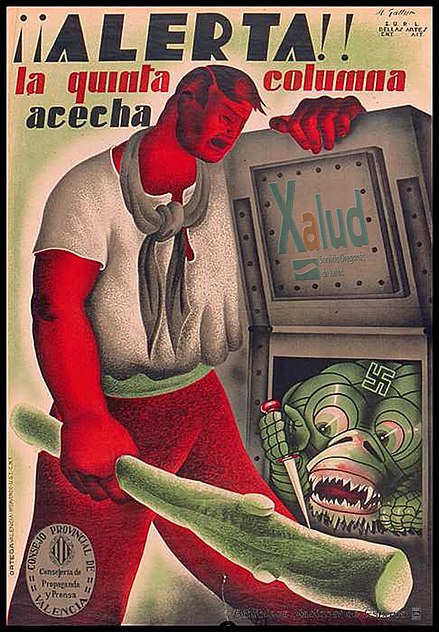
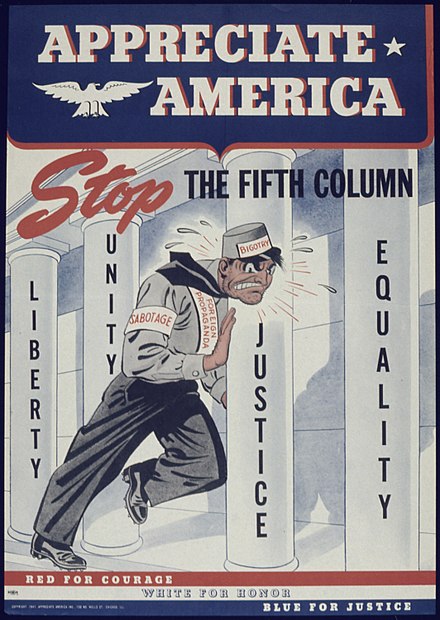
"Attention! The Fifth Column Warns!" – a propaganda poster of the Republican Spain. "Stop the Fifth Column" – American propaganda during World War II.
The author analyzed in detail the insidious role of the German minorityin different countries and tried to find out under what conditions such groups of people turned into the fifth column. Louis De Jong points to a number of factors that contributed to the Nazis' attempts to turn German communities abroad into an effective fifth column working for the Reich: the relative size of a group; territorial proximity to Germany; geographic concentration; degree of economic development; social status; historical ties to Germany; and the feeling of an oppressed minority.
These conclusions about the fifth column that emerged on the territories that were part of the Soviet empire three decades ago can be transformed, first of all, for those who long for the USSR, extrapolated to representatives of the nation that Joseph Stalin called "the most outstanding nation of all the nations that make up the Soviet Union." We are talking about a fairly significant number of ethnic Russians who, for various reasons, found themselves in the territories of the former Soviet republics at different times together with their descendants, but who were unable (unwilling) to integrate into a particular mental, ethnic, and cultural environment, and who felt psychologically uncomfortable with the collapse of the USSR. For the community that continues to identify itself with the "Soviet people," it is a great untruth that the Soviet Union has collapsed, that they (the "Soviets") are no longer able to dominate a large part of the world, that they cannot rule Ukrainians and other peoples and states as they used to.
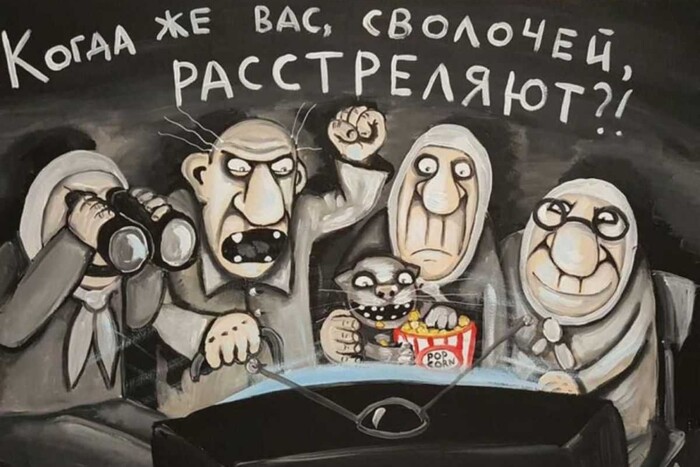
Let us recall the "good Russians," the so-called Russian liberals. On April 30, in Berlin, participants in a coordination meeting of the Russian opposition adopted the "Declaration of Russian Democratic Forces." The text of this document clearly shows how the so-called "good Russians" are trying to preserve a united and indivisible Russia within its internationally recognized borders, how they want to draw a line between the criminal regime and the citizens of the Russian Federation, who overwhelmingly supported and continue to support the Putin regime.
I recalled an excerpt from a letter of testament by Tsipora Birman, who died in the Bialystok ghetto in 1943: "We urge you to take revenge. Revenge without pity, without sentiment, without "good" Germans. "The 'good' German will have an easy death, he will be the last to die."
L. De Jong states that the German fifth column included any population group outside the Reich that contributed to the National Socialist territorial expansion, acting in accordance with secret instructions from the German authorities. The fifth column could consist of both ethnic Germans and citizens of other countries (representatives of pro-Nazi movements in Norway, Holland, France, Great Britain, etc.)
The classic analogue of the pro-Russian political fifth column in Ukraine was communists, representatives of various parties and movements (the most odious of which was Viktor Medvedchuk's "Ukrainian Choice", which was initially presented on advertising banners and city lights exclusively in Russian – "Украинский выбор"), who at various times acted in the interests of the Russian Federation, waging an open or covert struggle against the Ukrainian state. It can be assumed that some representatives of factions in the Verkhovna Rada are still guided by instructions from their Moscow handlers or act on their own beliefs, which are far from statehood.
The current subversive activities of the Moscow's fifth column in Ukraine – an extensive network of spies and saboteurs, collaborators, traitors, FSB and General Staff agents – are essentially a reflection, a copy of the history/consequences of the sinister operations of the Abwehr, Gestapo, SD, and supporters of Hitler's National Socialism outside Germany.
"Norway's capital and major seaports were not captured by weapons. They were quickly taken over by a gigantic conspiracy that can be called one of the most daring and well-organized political plots of the last 100 years. Using bribery and secretly sent agents, relying on traitors among high-ranking civilian and military figures in Norway, the German dictator managed to create a Trojan horse inside the country. All he needed to do was to recruit accomplices from among those who held key positions in the Norwegian government and navy. Everything was prepared flawlessly." This is how Leland Stov, a correspondent for the Chicago Daily News, wrote about this Nazi operation in his article after he reached Stockholm.
In the first week of Russia's large-scale invasion of Ukraine, a series of events occurred that make us think that these are not coincidences.
There were no Ukrainian troops on the border with Belarus, only border guards. The National Guard units were withdrawn from Gostomel, and 150 conscripts remained to guard the airport (we can also recall the tragic fate of the world's only An-225 aircraft, the Mriya). Zhulyany airport was not guarded at all.
As part of the "big construction", the highway to Chornobyl, which was used by 1-2 cars a day, was reconstructed and expanded. It was this modernized road that became one of the main roads used by the enemy in the February 2022 offensive.
It is also worth mentioning the strange "optimization" and downsizing of the Armed Forces in 2019-2020. For example, military unit A0229 (23rd separate tank battalion as part of the Air Assault Forces), which was stationed in the Ovruch district of Zhytomyr region, bordering Belarus, was disbanded. This unit was supposed to be deployed as a brigade to cover Kyiv from Belarus. By a strange coincidence, it was from there that the main offensive of Russian troops began.
It is still not officially clear on whose orders the minefields from the occupied Crimea to the territory of Ukraine were cleared in 2021. An investigation by the Hero of Ukraine, Security Service of Ukraine (SBU) Lieutenant General Hryhorii Omelchenko suggests some thoughts: "Surrender of the South of Ukraine: Criminal Negligence or High Treason?" ( https://umoloda.kyiv.ua/number/0/2006/169909);
"Generals vs. 'Vovchytsia' or the 'Three Monkeys' position on the surrender of southern Ukraine" ( https://umoloda.kyiv.ua/number/0/2006/176359/).
A week before the invasion, the command of the Armed Forces of Ukraine failed to fulfill an order to redeploy troops from the Kharkiv area to the Joint Forces Operation zone. This circumstance saved Kharkiv from the Nazi occupation.
In the first months of the enemy offensive, a number of state-owned enterprises that were supposed to be engaged in the purchase of weapons withdrew the equivalent of $243 million in an unknown direction.
Nuclear energy expert Olha Kosharna said that 70% of Energoatom's purchases in 2022 were made by... ZNPP, which is occupied by racists. In an interview with Glavkom, she said that if you analyze the activities of Energoatom, you can see that the company was waiting for the occupiers. On June 14, 2023, the S BU exposed a Kyiv company in cooperation with the sanctioned Rosatom...
Almost all the Javelins and Stingers were stored at the Yavoriv landfill. Tetyana Chornovol and Serhiy Pashynsky, on their own initiative, took it upon themselves to rescue Stugny and Neptune, as those directly responsible for the movement of these extremely effective weapons had disappeared.
Information to ponder. "In recent days, in recent weeks, our political colleagues, who call themselves the political opposition, have been calling for an urgent increase in funding for the Armed Forces of Ukraine, for the allocation of another 50 billion for security and defense. <...> But on the Day of Unity, we urge you not to turn these calls into political speculation. Because when asked where the figure of 50 billion came from, our political opponents say that it was calculated by some analysts" (from the speech of the representative of the President of Ukraine in the Verkhovna Rada V. Venislavsky on February 16, 2022, exactly a week before the start of large-scale aggression – transcript of the meeting of the Verkhovna Rada of Ukraine: https://www.rada.gov.ua/meeting/stenogr/show/7954.html).
On February 24, 2022, when the Russian Federation's large-scale invasion of Ukraine began, the first column of the invaders was formed of SOBR (Special Rapid Response Unit) units armed with batons and shields. These special forces were probably preparing to disperse rallies and protesters. They were very surprised when they encountered armed resistance and began to destroy them. In the destroyed equipment of the aggressors, Ukrainian soldiers found ceremonial uniforms, three days' food rations, scant ammunition, and prepared "kill lists" of Ukrainian citizens who were to be eliminated in the first days of the occupation. Where did these lists come from? Someone helped to compile them...
And it was at this time, for some reason, that the Kyiv District Administrative Court accepted a lawsuit from Yanukovych's lawyers about his unlawful removal from the presidency. It should be noted that on February 28, 2023, the State Judicial Administration of Ukraine registered the Kyiv City District Administrative Court, formed after the liquidation of the District Administrative Court of the evil memory, known for making high-profile decisions, including the abolition of the new Ukrainian spelling, the cancellation of the Kyiv City Council's decision to rename Moskovsky Avenue to Bandera Avenue, the recognition of the nationalization of Privatbank as illegal, the suspension of the process of renaming the UOC (MP), the reinstatement of Roman Nasirov as head of the State Fiscal Service of Ukraine.
The question involuntarily arises: did the Russian side on February 24, 2023, begin to implement some backroom agreements – the planned latent occupation of Kyiv, Chernihiv, Sumy, Kharkiv, Kherson, Mykolaiv, Zaporizhzhia? Of course, this is just a guess, but it seems that the fifth column was involved.
But then something went wrong in the aggressor's plans – the Armed Forces began to carefully follow the requirements of the "Articles of War" – the official guiding document that establishes the basics of military operations, the "Internal Service Statute," the "Disciplinary Statute," the "Garrison and Guard Service Statute" and, of course, the Constitution, rather than being guided by political orders from Bankova Street. The police, the National Guard, and citizens have begun to fulfill their direct responsibilities under the Basic Law of Ukraine – to destroy uninvited guests.
In this context, many questions arise to the country's top leadership, executive services and state structures, including Ivan Bakanov, who was subject to a closed investigation. But for some reason, the murder of businessman Kireev, allegedly a Main Intelligence Directorate of the Ukrainian Ministry of Defense (H UR) agent, by S BU officers has not been clarified. More about the mysterious circumstances of this murder can be found in my article "Bolivar Can't Hold Two? About Crime and Punishment, or a Misunderstanding Costing a Life" ( https://universum.lviv.ua/data/magarticles/files/3271.pdf).
Three years ago, in my article "Trojan Horses in Ukraine" ( https://universum.lviv.ua/magazines/universum/2020/4/tr-koni.html), I drew attention to how on July 1, 2020, SBI investigators conducted authorized inspections of military equipment on the territory of several military units of the Air Force of the Armed Forces of Ukraine, illegally seizing 7 microwave devices (klystrons) and thereby rendering the anti-aircraft installations inoperable. Thanks to the "Trojan horses," the Russian special services were able to find out how the Ukrainian Armed Forces equip their S-300s with search and targeting devices. Because they are produced only in Russia and not exported to hostile Ukraine. With the help of agents, the enemy was able to expose the channels of supply of prohibited equipment for the Armed Forces of Ukraine from Russia...
Who was responsible for the failure of the missile program? This is not a rhetorical question. Could it be answered by former Defense Minister Anatoliy Taran, who is now in charge of the Ukrainian embassy in Slovenia? Or maybe Oleksiy Reznikov, who is familiar with violations of procurement laws in the Ukrainian Defense Ministry during the war, knows about this?
The functions of the fifth column in peacetime and wartime are different. They can be summarized in two words: "subversion" in peacetime and "sabotage" in wartime.
The cases of "peaceful subversion" include mockery of the Ukrainian language, which was a constant feature of almost every Kvartal-95 performance for almost two decades, and which was carried out in thousands of different methods and temporal and spatial forms.
Can the draft law "On the Use of the English Language in Ukraine" prepared by someone for Volodymyr Zelenskyy and submitted by the President to the Verkhovna Rada be considered a case of "peaceful subversion"? Isn't it clear how this initiative, approved by the parliament, will hit the position of the Ukrainian language in film distribution and television broadcasting and Ukrainian film dubbing? Is it not clear that this is an aggressive attack on the Ukrainian language? However, it seems that the ministers of culture and education do not understand this.
Another oddity. The National Commission on State Language Standards proposes completely inappropriate and illogical recommendations for renaming 1400 cities and villages, allegedly to implement the law "On Condemnation and Prohibition of Propaganda of Russian Imperial Policy in Ukraine and Decolonization of Place Names" (even Zaporizhzhia is on this list), clearly confusing the ideological aspect with the linguistic one.
And this is despite the fact that linguistic outrages continue even during the war. Here are just a few examples of linguistic and political confrontation: "Banderlogs will soon be gone" is the headline of a story about another language-related scandal in Odesa; because a cashier at the Odesa Epicenter addressed a customer in Ukrainian, the woman began shouting that Ukraine should be part of the Russian Federation; in the same city, a Russian-speaking law enforcement officer and his supervisor were suspended from duty due to a language conflict with a visitor; a language scandal arose in one of the entertainment centers of Bila Tserkva because of a song sung by a drunken visitor in karaoke...
In the village of Pohreby in the Kyiv region, a girl was kicked out of a cafe for making comments about the performance of a Russian song by Putinist Grigory Leps. The police drew up a report under Part 1 of Article 155 of the Code of Administrative Offenses. After a court decision, the cafe owner will have to pay a fine.
A Kharkiv taxi driver told a passenger that "Ukraine does not exist" and advised her to go to the "west". "You know where you live. Kharkiv is a Russian-speaking city. Everyone here speaks Russian." When asked why he would not go to Russia, the taxi driver replied: "I am 50 years old, I was born here, I lived here, I spoke Russian and I will continue to speak Russian, no Ukrainian nerd language will change my mind... Go to the west, or wherever they speak a nerd language" ( https://patrioty.org.ua/society/idte-na-zapadenshchynu-chy-de-tam-balakaiut-na-zadochnii-movi-u-kharkovi-taksyst-obrazyv-pasazhyrku-cherez-ukrainsku-473322.html). It can be assumed that this Kharkiv resident (a potential five-columnist), mobilized to the Armed Forces, may shoot Ukrainian-speaking soldiers in the back during a battle...
The tragedy of the situation is that we have both external and internal enemies. This is a more than eloquent quote from the article by Hryhorii Omelchenko, Hero of Ukraine, Lieutenant General of the Security Service of Ukraine, PhD in Law, "They are still among us: former KGB agents now work for the FSB and continue to threaten Ukraine," which was published in Ukraina Moloda on September 10, 2019 ( HTTPS://UMOLODA.KYIV.UA/NUMBER/3504/188/137060/): "The open Russian "fifth column" in Ukraine, which is the "Moscow occupation" block "For Life" headed by two former KGB agents (I do not exclude that they are also current FSB agents) and the underground Communist Party, and the hidden one, whose representatives are disguised in the Servant of the People faction, is a real threat to Ukraine's loss of sovereignty, independence and the country's transformation into a satellite of the Russian Federation or dismemberment of Ukraine. All of them are political whores, traitors, agents of the Kremlin's influence! <...> In early September 2005, the heads of the S BU, Turchynov and Kozhemiakin, destroyed 13 volumes of the dossier on the international criminal authority Mohylevych. The documents were destroyed the day before Yulia Tymoshenko resigned as Prime Minister (September 8, 2005). <...> On April 12, 2006, Prosecutor General Medvedko instructed Interior Minister Lutsenko to arrest Turchynov and Kozhemiakin for the destruction of the Mohylevych Dossier. Medvedko was going to charge them with illegally destroying secret documents about "Tymoshenko's criminal cooperation with Mohylevych in the second half of the 1990s, when Yulia Volodymyrivna was in charge of the UESU company. <...> Among Turchynov's high-profile statements, for example, is the following: "Ukrainians are a cowardly, ungrateful, whining nation that has gained unexpected freedom, and who sigh for the carefree and moderately well-fed days of slavery... They can hardly be called a great nation" ("Vechernye Vesti", 25.09.2003).
Although the activities of the fifth column are usually viewed as conscious and deliberate, many people have unintentionally (victims of IPSO, so-called "useful idiots") but objectively contributed to Russia's territorial expansion. Along with the purposeful collaborators (Russia's sympathizers, deeply hidden "canned goods"), there are many passive observers who, without directly participating in the information war, contribute to the Russian invasion by their indifference.
"The other day I was on Svobody Square in Kharkiv, and there was no limit to my discontent. Where the monument to Lenin used to stand, there is now a den of Banderites. It's full of anti-Putin and anti-Russian slogans, right-wing flags and propaganda. And then they say that there is no Nazism in our country." The author of this anti-Ukrainian nonsense is a fourteen-year-old Kharkiv resident. The girl sang the Russian national anthem, said she wanted to live in Russia, and showed how she was gluing the flag of the "People's Republic of China" on Freedom Square. She posted all this on her Instagram.
The police took up the case (https://glavcom.ua/country/criminal/spivala-himn-rf-na-tsentralnij-ploshchi-14-richnoju-prikhilnitseju-putina-iz-kharkova-zajnjalasja-politsija-video-936368.html). The underage supporter of racism pleaded guilty and apologized to Ukrainians in Russian (!) in a very unconvincing manner.
On July 4, three teenagers in the Mykolaiv region shocked the Internet with a cynical statement about Ukrainian soldiers who stood up to defend Ukraine. In response to commentators' reproach that they should not organize pompous parties while defenders are shedding blood at the front, they said that "they were not sent there" ( https://patrioty.org.ua/society/my-ikh-ne-vidpravlialy-krov-prolyvaty-pidlitky-na-mykolaivshchyni-shokuvaly-tsynichnoiu-zaiavoiu-pro-zahyblykh-heroiv-video-473810.html).
And here is an interesting logical connection. According to a survey conducted by the International Sociological Institute on the attitude of citizens to Ukraine's accession to NATO, the highest support for accession is in the west of our country (85% to 92% in regional centers). The lowest support for joining the Alliance is in the west: Odesa (18%), Kharkiv (16%), Dnipro (11%), Zaporizhzhia (10%), and Mykolaiv (8%). According to a sociological survey conducted in 2022 by the Ilko Kucheriv Foundation for Civic Initiatives, 71% of Ukrainian citizens spoke Ukrainian in everyday life, compared to 64% in 2021. In the West – 95.6%, in the Center – 78.3%, in the South – 34.6%, in the East – 40.3%.
This leads to a quite logical conclusion about the negative impact of the Russian language on the intelligence of Ukrainians. In other words, the Russian language is a weapon of mass impression on the minds of our compatriots.
The Internet informs: "The Fifth Column in Lviv, or Who is Maria Pyz-Pakosh" ( http://dyvys.info/2016/08/11/p-yata-kolona-u-lvovi-abo-hto-taka/ August 11, 2016); in June 2023, the Galician Court of Lviv began considering the case of treason against Inna Ivanochko, the former head of the Lviv regional organization of the Opposition Platform – For Life political party, who, according to the investigation, was recruited by the Russian special services in 2015; another Lviv resident, journalist Olena Boyko (Vishchur), was found guilty by the Halytskyi District Court of Lviv of encroachment on the territorial integrity of Ukraine...
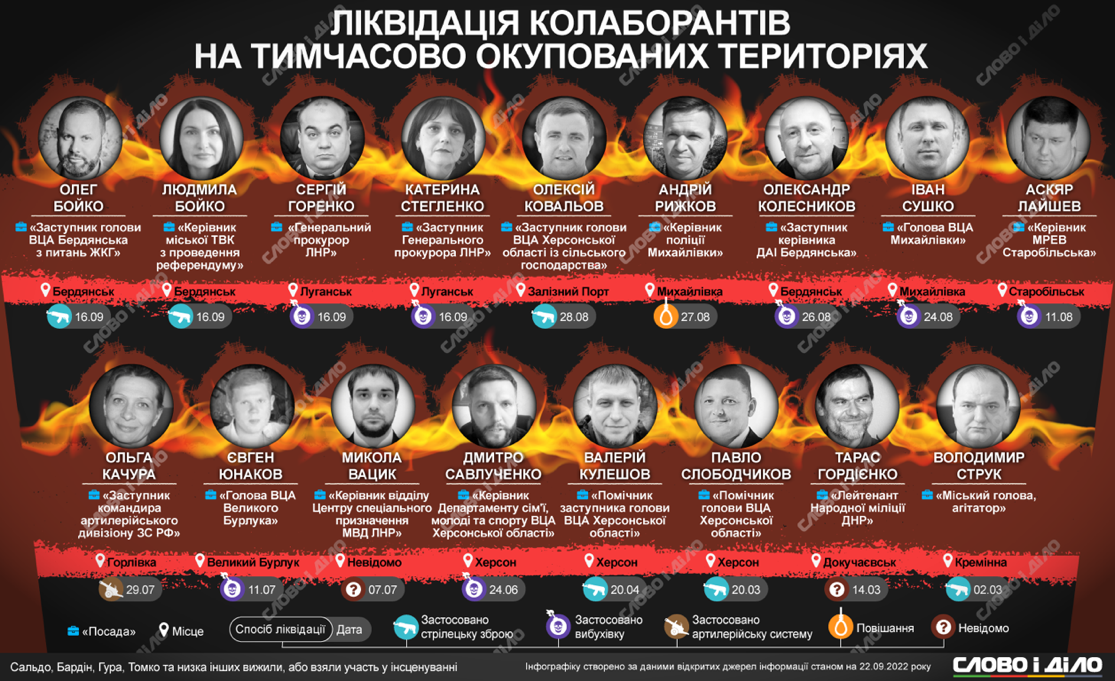
"Ukraine is teeming with collaborators" was the title of my article in the weekly "Krayina" on January 19, 2017 ( https://gazeta.ua/articles/opinions-journal/_ukrayina-kishit-kolaborantami/745704). It mentioned, in particular, the actions of 148 MPs of the Verkhovna Rada of Ukraine, who on July 1, 2013, appealed to the Sejm of the Republic of Poland to recognize the Volyn tragedy as genocide of the Polish people. The document also stated that "xenophobic, anti-Semitic and neo-Nazi sentiments are growing in Ukraine. Their representatives are already in the Verkhovna Rada today". The undermining of Ukraine's information security by these actions of MPs constitutes a self-sufficient crime under Article 111 of the Criminal Code of Ukraine – high treason. The legal basis for this statement is Article 17(1) of the Constitution of Ukraine and Article 111 of the Criminal Code of Ukraine. Among the elements of the disposition contained in Article 111(1) of the Criminal Code of Ukraine, which define the actions of a particular subject as criminal, the following is directly applicable (in accordance with the situation with the appeal to the Polish Sejm): harming the information security of Ukraine.
Former President Leonid Kravchuk noted: "The statement of 148 deputies calling on the Polish Sejm to recognize the events in Volyn as genocide is an unprecedented case in world history when politicians ask the legislative body of another state to accuse representatives of their own people of the most serious of crimes. This step can be equated to national treason."
Former Prime Minister Yevhen Marchuk reacted no less sharply: "The appeal of the Ukrainian MPs to the Polish Sejm is a shameful step on the part of all the signatories. It is at least indecent to appeal to a foreign parliament or government to have something bad done to your country. I think there was some influence of some Russian structures here."
The story of collaborator Yevhen Balytskyi, a former MP, is noteworthy. His uncle Vsevolod Balytskyi was an "exemplary" Chekist. This scoundrel has the blood of hundreds of thousands of murdered Ukrainians on his hands, and he is directly responsible for the Holodomor. The S BU established that former MP from the Opposition Bloc party Yevhen Balytskyi was one of the first to publicly support the Russian occupiers at the beginning of the full-scale invasion, who, in gratitude, appointed the traitor as the head of the occupation administration in the temporarily occupied part of Zaporizhzhia region. A Ukrainian court found the collaborator guilty under two articles of the Criminal Code and sentenced him in absentia to 15 years in prison. Vsevolod Balytsky was executed for treason on suspicion of participating in a "military-fascist conspiracy" and spying for Germany.
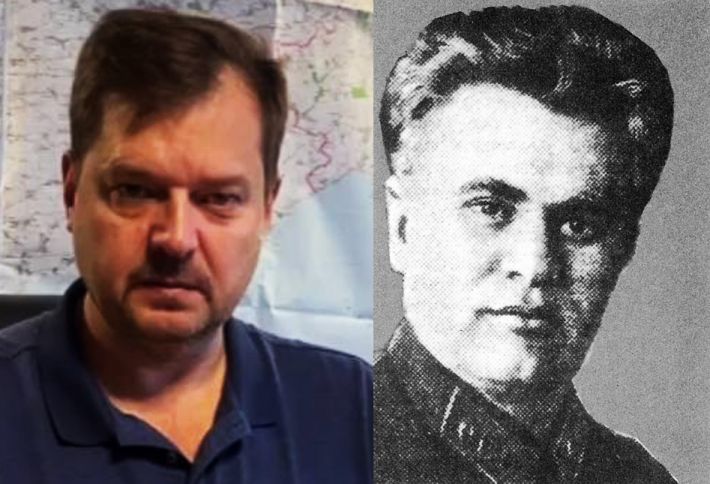
The Ministry of Justice has already banned the activities of two dozen pro-Russian political parties in Ukraine. However, this belated court decision did not affect the former functionaries of the formally liquidated Opposition Platform – For Life (OPFL). Shufrych and the Boyko faction do not feel any discomfort in the Verkhovna Rada.
Such outspoken Ukrainophobes as the sanctioned MP Oleksandr Dubinskyi, Maksym Buzhanskyi, Vadym Stolar have not disappeared from the parliament and continue to carry out destructive work...
It is the representatives of the fifth column in the Verkhovna Rada who are doing their best to stop the subversive activities of the Moscow Church in Ukraine, blocking the adoption of bills to ban this racist sect, despite the fact that the necessary documents have long been registered in parliament.
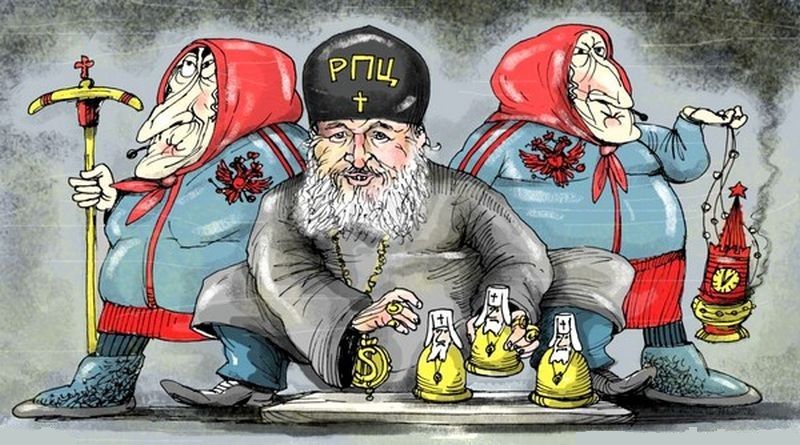
Illustration by Oleksiy Kustovsky/Radio Liberty
Corruption is an integral part of the Ukrainian government. It did not disappear even during the war. Even in the Ministry of Defense. "Corruption still exists in Ukraine, and the war has not changed that," stated Mariëlle Tweebeeke, a Dutch journalist with the Nieuwsuur project of the NOS TV channel, in a conversation with Volodymyr Zelenskyy on April 28, 2022, who emotionally denied it: "How can you say that there is corruption in Ukraine now? How can you?"
The same year, on November 18, Volodymyr Zelenskyy, in his speech at the Bloomberg New Economy Forum, optimistically announced a significant reduction in the level of corruption in Ukraine: "There will be no corruption, there is no corruption now, of course, because we are all united. Many corrupt officials have left with their money, and we will do everything to keep them where they are."
Information for reflection. On June 20, 2023, a Ukrainian citizen with a diplomatic passport was detained in Switzerland while attempting to conduct financial transactions with deposit accounts of the former Credit Suisse (now controlled by UBS Group AG), which are subject to financial monitoring by the US Treasury Department. In other words, the Ukrainian citizen was trying to withdraw Russian funds from sanctions, which were frozen in Swiss financial institutions due to Russia's aggression against Ukraine. Interestingly, the detainee was handed over to authorized representatives of the US Embassy, not the Ukrainian Embassy.
How can such actions be qualified?
Previously, Ukrainian authorities have made efforts to help representatives of the enemy avoid sanctions. For example, David Arakhamia wrote a letter confirming that Abramovich had "saved" 400,000 Ukrainians. This letter was used by the oligarch's lawyers in courts to lift sanctions against Putin's "wallet." President of Ukraine Volodymyr Zelenskyy also asked Joe Biden to remove Russian oligarch Roman Abramovich from the already prepared sanctions list so that he could continue to mediate in negotiations with Russia.
By the way, in June of this year, this Russian oligarch did not agree to the transfer of 2.3 billion pounds from the Chelsea club to Ukraine, which he sold to avoid sanctions. Abramovich did not sign an agreement to transfer these funds to Ukraine. He explained this by saying that he would prefer to give part of the proceeds to "Russians who suffered from the war." Since the British government did not agree to this, the oligarch's accounts remain blocked...
But we are talking about something else. In the context of the war in Ukraine, official looting, theft of humanitarian aid, enrichment through military procurement, and brutal scheming in billion-dollar "asphalt" tenders are rampant.
These are just a few of the headlines that appeared in the media in June 2023: "NABU and SAPO Detain Head of Ternopil Regional Council and Two Deputy Heads of Military Department"; "Corruption Scandal. Odesa military commissar dismissed from his post"; "Colonel of Lviv University of Life Safety Detained for Bribery"; "Lviv Bailiff Service Official Detained for Bribery of $1300"; "Lviv Customs Uncovered a Scheme of Extortion in Car Customs Clearance"; "Deputy Chief Military Prosecutor of Zakarpattia Detained for Bribery"; "Director of Local College Caught in Ternopil Region for Bribery"; "Former Deputy Minister of Infrastructure Vasyl Lozynskyi Arrested Again. Lozynsky may be released on bail of UAH 5 million"...
In May, bribe-taking MP Trubitsyn traveled abroad with the permission of Kyrylo Budanov – the head of the HUR wrote a letter allowing Vladyslav Trubitsyn to cross the border with Poland...
The Ukrainian news feed is full of reports of another bribe-taker's detention. There is no end to the stories of the fight against this cancer on the body of the state. On February 2, 2023, the S BU reported that law enforcement officers had exposed and blocked a large-scale corruption scheme organized by the leadership of the Sumy Regional Military District. Officials misappropriated state funds allocated to the region for infrastructure restoration.
Journalists report on "tons of coffee for Naftogaz," a fleet of vehicles for the village council and a luxurious stadium "shelter" in Polissya, and a scandalous story about the purchase of drums for Kyiv shelters...
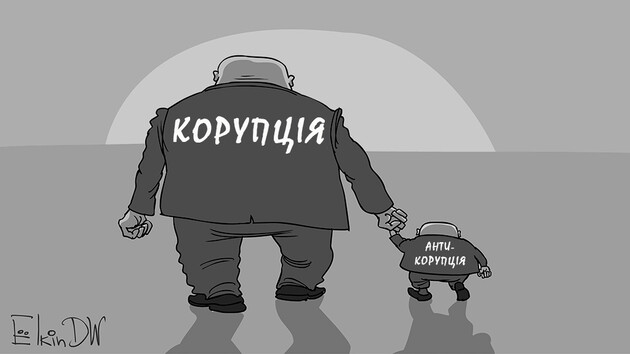
Illustration by Serhiy Yolkin/DW
For the Ukrainian state, the summary is disappointing: corruption has not disappeared during the war. It has become even more cynical. Officials carry out their criminal deals under the guise of patriotic and nationalist slogans. It seems that corruption is above the law in Ukraine. And it is. The National Anti-Corruption Bureau has put former head of the State Property Fund Dmytro Sennichenko and former head of the National Bank Kyrylo Shevchenko on the wanted list. The NABU is also looking for Ukrgasbank officials involved in the embezzlement of more than UAH 200 million... The story of the illegal enrichment of the head of the regional tax office, who bought an elite apartment in Kyiv during the war, is also a case in point: SBI officers have already conducted searches as part of the criminal investigation...
Smuggling is an eternal topic. Border guards and customs officers cannot overcome it. Because they themselves are often involved in financial scams.
The problem of corruption is a problem of state security. This is an axiom. In wartime, hucksterism is a state crime. During World War II, people were shot for it.
However, in Ukraine, the state repressive machine does not work properly against corrupt officials, who turn into looters and traitors during the war and should be subject to the most severe punishment.
By the way. On June 28, President Volodymyr Zelenskyy enacted the decision of the National Security and Defense Council "On Accelerating Judicial Reform and Overcoming Corruption in the Justice System." From now on, corruption in the courts will be punishable by 10-15 years in prison with confiscation of property. The relevant decree is posted on the website of the Presidential Office...
Will it work? In early July, employees of the Prosecutor General's Office and the State Bureau of Investigation, with the operational support of the Security Service of Ukraine, served a notice of suspicion to the head of a court in one of the districts of Cherkasy region, who had justified the armed aggression of the Russian Federation against Ukraine. Is this not a confirmation of the existence of the fifth column in the Ukrainian justice system?
The inadequate personnel policy is of great concern. The scandalous appointment of a person with a dubious reputation as ambassador to Bulgaria is just one example...
On June 30, at its meeting, the Cabinet of Ministers appointed Olena Duma as the head of the National Agency for Finding, Tracing and Management of Corrupt Assets. This was despite the fact that G7 ambassadors had urged the government not to appoint Duma as the head of ARMA. Despite the fact that Transparency International has pointed out a significant danger: "Four years ago, the future head of the ARMA was directly involved in attempts to discredit her country and the current US president, who, for his part, strongly supports our country in countering Russian aggression and in anti-corruption progress." Despite the fact that among the claims against Olena Duma are the following: lack of professional experience, in particular related to criminal justice, political bias, alleged business contacts with persons suspected of treason and cooperation with Russia, in particular the former head of the Crimean SBU Oleg Kulinich.
On June 28, Ruslan Ryhovanov, a participant in pro-Kremlin shows, was appointed acting director of the Resource Support Department of the Ministry of Defense of Ukraine. However, after controversial information about him was published in the media, the Ministry of Defense announced his dismissal and an inspection....
As for the functions of the fifth column in wartime, according to Louis De Jong, they were limited to assisting German troops from within during the aggression itself (reconnaissance, signaling, sabotage, evasion of mobilization, up to shooting their fellow citizens in the back). There were certainly many transitional, intermediate options between the military and political fifth columns. Louis De Jong sees the military fifth column as a logical conclusion, as the culmination of the development of the political fifth column. And he is right.
In November 2014, Ukrainska Pravda reported that "since February 24, more than 2,500 employees have been dismissed from the SBU. The SBU staff was reduced by 24%. Among those dismissed are 108 heads of departments of the Central Department and regional bodies of the SBU and their deputies. <...> For betrayal of the military oath, 1371 employees of the Main Department of the SBU in the Autonomous Republic of Crimea and the SBU in Sevastopol were dismissed from military service for incompetence and removed from the military register".
July 5, 2023 Newsweek has examined in depth the scale and scope of the CIA's activities in Ukraine (https://www.newsweek.com/2023/07/21/exclusive-cias...). We quote: «A good part of our time is taken up hunting down Russian penetrations of foreign governments and intelligence services, says a military counterintelligence official working on the Ukraine war. — We have been successful in identifying Russian spies inside the Ukrainian government and military, and at various other points in the supply chain . <…> As billions of dollars worth of arms started flowing through Eastern Europe, another issue that the CIA is working on is the task of fighting corruption, which turned out to be a major problem. This involves not only accounting for where weapons are going but also quashing the pilfering and kickbacks involved in the movement of so much materiel to Ukraine».
Information to ponder. In January-May 2023 alone, the Prosecutor General's Office opened more than 2,300 proceedings under the articles "high treason" and "collaboration". However, only about 11% of the cases have been brought to court.
SBU officers expose online propagandists who call for an alliance with a terrorist country and deny its aggression. They neutralize agitators who spread Kremlin propaganda on the Internet and discredit the Armed Forces. For example, it turned out that there was a network of supporters of Viktor Medvedchuk's so-called "Ukrainian Choice" in Lviv region, which extended its activities to other regions of Ukraine.
It should be emphasized that this is not only about agents of influence or "useful idiots", but about saboteurs, traitors, collaborators, "moles" ( SBU: FSB of the Russian Federation appointed traitors to the leadership of the SBU and dismissed General Baranetsky 04/05/2023 – https://www.youtube.com/watch?v=tBn0xCi1kjw).
It should be emphasized that these were not only agents of influence or "useful idiots," but also saboteurs, traitors, collaborators, and moles. SBU counterintelligence regularly detains traitors, informants and saboteurs. It is likely that thanks to the moles, a warehouse with huge stocks of ammunition was destroyed near Khmelnytsky on the night of May 13-14, which could not but affect the course of the further offensive of the Ukrainian army.
Finally, an outspoken five-columnist, Vyacheslav Boguslaev, president of Motor Sich JSC, widely known for his anti-Ukrainian views and openly anti-state actions, was arrested. He, an MP, has finally been charged with high treason (obviously belatedly). A natural question arises: where did the people look when they elected to the parliament a person who, through his actions, was responsible for implementing a policy that undermined and threatened the territorial integrity, sovereignty and independence of Ukraine for a long time? The question is rhetorical. It can be assumed that Boguslaev, even while in jail, is optimistic about an exchange with the Russian side. Despite the fact that interstate relations adhere to an ironclad rule: agents are not exchanged for intelligence officers. However, there have been exceptions in the modern history of Ukraine – Viktor Medvedchuk and Volodymyr Tsemakh were not spies...
A brief June chronicle of the dangerous work of Ukrainian counterintelligence: On June 20, 2023, the SBU exposed two Internet agitators in Kharkiv who supported Russia's armed aggression; on June 27, the SBU detained the gunner of a Russian missile strike on Kramatorsk "in hot pursuit"; on June 30, the SBU neutralized the FSB's agent network in Kharkiv. Its members were targeting the city with Russian Smerch and Uragan multiple rocket launchers; in June, the prosecutor of Mykolaiv received a life sentence for high treason; on June 22, an informant who was adjusting Russian air strikes on the city was exposed in Mykolaiv; in Zhytomyr region, the SBU exposed a Russian mole in the Armed Forces of Ukraine – the traitor was collecting information for the FSB; an enemy agent, an employee of the Ukrzaliznytsia station, who recorded the coordinates of railway stations and bridges through which heavy weapons and ammunition were being redeployed, was exposed; the traitor leaked data on the defense of Ukraine's northern borders in Sumy region...
During the Second World War, the opposing sides ingeniously combined various arsenals of psychological techniques to maintain the morale of their populations, seeking to create the most truthful picture possible. Various posters and booklets were printed. Propaganda films were produced. Laughter is a ruthless weapon. But are witty Internet memes directed against Putin and Co. enough nowadays? Is it possible to turn an enemy into an ally?
There is a problem with fighting spies and protecting state secrets. How to warn citizens against excessive talkativeness and teach them to pay attention to suspicious actions of possible "moles" instead. At one time, this mission was fulfilled by the textbook slogans of Soviet rear posters from the Second World War: "Don't talk!", "Don't talk near the phone! A chatterbox is a godsend for a spy!", "Don't talk, the enemy is listening!", "To talk is to help the enemy!", "Don't chatter! Strictly keep military and state secrets!". The Germans, the British, and the Americans had similar propaganda clichés. Louis DeYoung wrote in his research about how American citizens of Japanese descent were interned in the United States during World War II.
Today, Czech President Peter Pavel believes that Russians should be subjected to enhanced security measures. In his opinion, Russians living in European countries should be "under the scrutiny of special services" even if they oppose the war with Ukraine. Peter Pavel cited the example of the forced relocation to "military relocation centers" during World War II of Japanese born in the United States who lived in this country and had an American passport.
According to the Czech president, this experience should be taken into account when it comes to Russians living in Europe. "I may feel sorry for these people, but... this is just the price of war. I have often heard the argument that we should perceive what is happening in Ukraine only as "Putin's war" and not as "Russia's war". This is a bad argument. We look at the support that President Putin has among the Russian population. We see how many people support the war, how many even call for the war to spread to other countries. And we should call it "Russia's war".
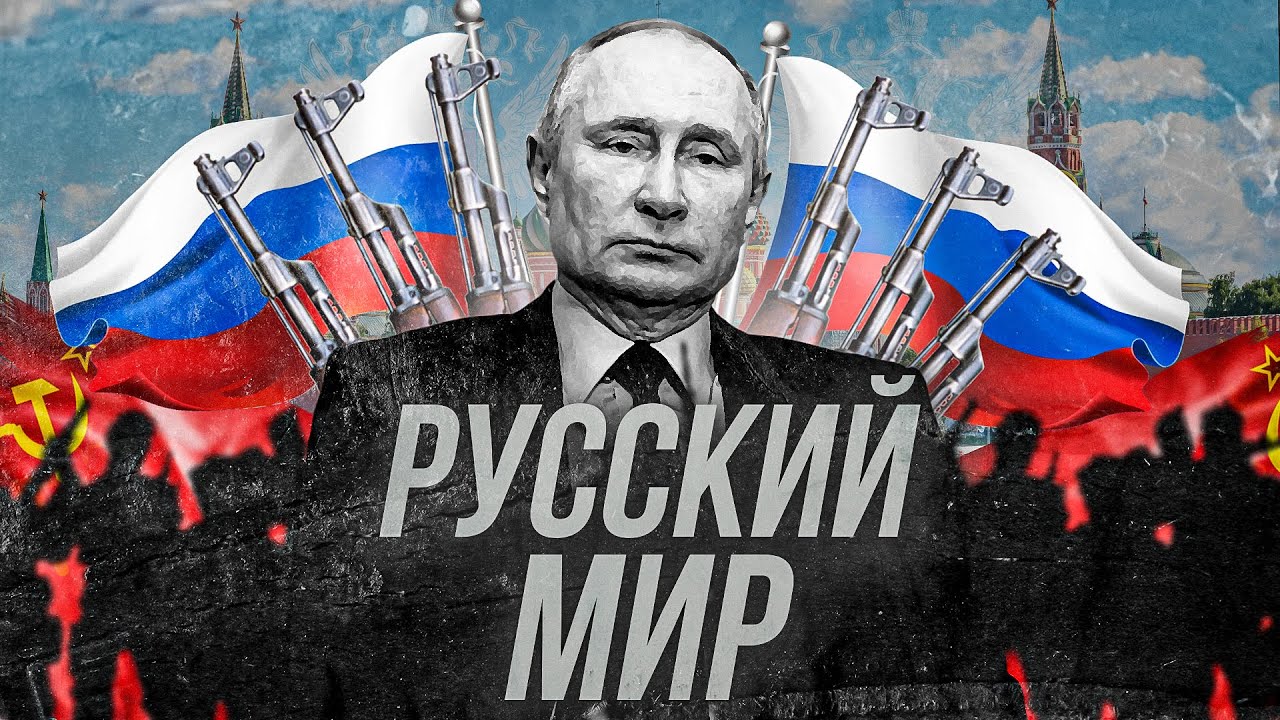
Definiteness, consistency, consistency and validity are essential qualities of correct thinking. Conscious or unconscious violation of logical laws leads to an incorrect conclusion. These basic principles of logical thinking came to mind when I read the article by Oksana Torop and Sviatoslav Khomenko, "First after God, in a good way. How General Zaluzhny became who he is", posted on the BBC News Ukraine website on June 14.
A fragment of the text caught my eye: "It was then that a senior government official called the then head of the SBU, Ivan Bakanov. He demanded that he order his special forces to blow up the bridges and cut off the left bank of the Dnipro from the right.
The situation was complicated. Bakanov called General Valeriy Zaluzhnyi, the commander-in-chief of the Ukrainian Armed Forces. He listened to him and answered without hesitation: "Blow up the bridges? No way! It would be a betrayal of those who remained on the left bank of the Dnipro, both military and civilians."
What tasks are within the competence of the Head of the SBU and the Commander-in-Chief of the Armed Forces? They are different. One and the other have a different functional, as "advanced" politicians like to say.
Did Lieutenant Ivan Bakanov know that the Armed Forces of Ukraine have a "Statute of Internal Service", "Disciplinary Statute", "Statute of Garrison and Guard Service", not to mention the "Combat Statute – an official guiding document that establishes the basis for combat operations of troops? By the way, the Constitution of Ukraine (Article 60) clearly states: "No one shall be obliged to execute manifestly criminal orders or instructions. The giving and execution of a clearly criminal order or instruction shall be subject to legal liability"...
It was the third day of the war, February 26, 2022. The article actually begins like this: "February 26, 2022, the third day of Russia's full-scale invasion of Ukraine. It is already obvious that the Russian plan to "capture Kyiv in three days" has failed, but the scales on the fronts are still tipping in both directions."
Who could have actually ordered Zaluzhnyi to organize the blowing up of eight bridges near the capital, even based on common sense, following the logic and logistics of the laws of war, rules and tasks that the Armed Forces of Ukraine are supposed to solve/execute/solve? That's right: his immediate superior is the Supreme Commander-in-Chief Volodymyr Zelenskyy.
However, some mysterious high-ranking official, bypassing the Commander-in-Chief of the Armed Forces, orders the head of the SBU to carry out a military operation – to organize the blowing up of bridges. The question is: who exactly called Bakanov and why did they call him?
And then there is something surreal/phantasmagorical: "Bakanov called the commander-in-chief of the Armed Forces, General Valeriy Zaluzhny. The latter listened to him and answered without hesitation: "Blow up the bridges? Absolutely not!!!".
Why on earth would Lieutenant Bakanov order the general to blow up the bridges? Was it his responsibility? The general reacted correctly and categorically refused.
An interesting detail. Serhiy Rakhmanin, MP of the Voice faction, member of the Verkhovna Rada Committee on National Security, Defense and Intelligence, said in an interview with Radio NV on June 11, 2022: "On February 24, the first day of the war, I was a participant in a meeting with the president. I represented the Voice faction. I directly saw almost all the heads of central government agencies who were either at work or in direct communication with the president. The only person I did not see was Ivan Bakanov" ( https://nv.ua/ukr/ukraine/politics/chomu-rosiya-shvidko-okupuvala-pivden-yak-problemi-z-sbu-i-bakanovim-rahmanin-novini-ukrajini-50249135.html).
Who knows, maybe Lieutenant Bakanov was working on Kyiv bridges until February 26, and then he called Zaluzhnyi with knowledge of the matter, following orders from an unknown high-ranking official?
Without irony, other questions involuntarily arise: on whose orders were three bridges in the northwestern part of Kyiv blown up to stop the passage of the racists – the bridge on the Novoirpinska highway, the bridge in Hostomel on the Warsaw highway, and the bridge across the Irpin river in Demydiv? What happened to the other bridges on the left bank? were they blown up or left untouched? For some reason, the authors of the article forgot to mention the stories of the Salkivsky, Antonivsky, and Varvarovsky bridges...
In the story of Kyiv bridges published by the BBC, the fifth column was left out of the picture. Because, according to the laws of logic (or, in this case, perhaps the rules of the genre), the creation of such a text necessarily requires at least a mention of the fate of the bridges in Kherson and Mykolaiv regions, both those blown up and those not.
The authors of the study Russia's Willing Collaborators, published on June 8, 2023, in FOREIGN AFFAIRS, draw attention to the problem of collaborators, especially in the territories occupied by Russia. If Kyiv successfully regains significant territories, as it did in the fall of 2022, it will have to decide what to do with people who collaborated with the Russian occupation authorities and forces or otherwise assisted them in repressing the local population and propaganda. Since the beginning of its illegal invasion of Ukraine in 2014, Russia has actively relied on collaborators to establish its control over the occupied territories, obtain information about military targets, help suppress dissent and spread propaganda in the occupied territories, and sabotage Ukrainian democracy from within, for example, by infiltrating Ukrainian state institutions to further Moscow's aggressive agenda.
Along with the purposeful collaborators, there are many Russian sympathizers or passive observers who, although not directly involved in the war, contribute to the Russian invasion through their ideological orientation or even simple indifference.
"As the world experience shows, in every war, unfortunately, there is such a phenomenon as collaborationism, the fight against which is an indispensable component of victory. Therefore, the adoption by the Verkhovna Rada of Ukraine in March 2022 of amendments to the Criminal Code of Ukraine, which define the concept of collaborationism, its forms and responsibility for it, is timely and justified" (Stanislav Kravchenko, Chief Justice of the Supreme Court of Ukraine).
In dealing with the problem of the fifth column, Russian collaborators – and those suspected or accused of collaboration – Ukraine faces a difficult choice. It will have to deal with tens or even hundreds of thousands of people who may be subject to lustration under the most lenient criteria.
But this is another story.
Today's agenda includes not only successful armed confrontation with Russian aggression, but also effective struggle against the fifth column inside the Ukrainian state.
"It seems clear how to deal with national treason, which, as we already know from history, leads to the decline of the state and nation – the use of strict law and order. And all of us, those who believe in the resurrection of an independent Ukraine, must think and act together about ways to achieve this."
This idea was expressed three decades ago by the prominent Ukrainian historian Yaroslav Dashkevych.
Oleh K. Romanchuk, Ph D,
editor-in-chief of the magazine "Universum" – https://universum.lviv.ua/


